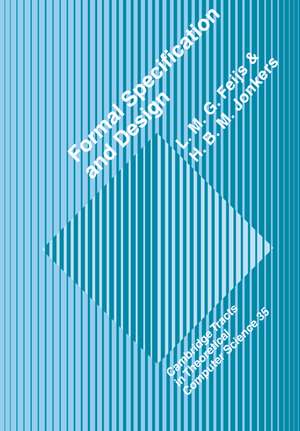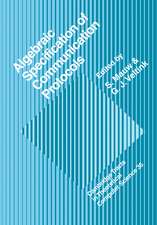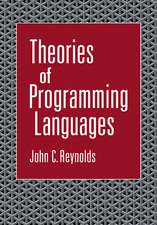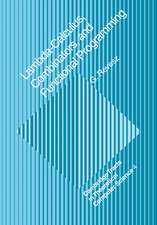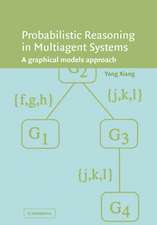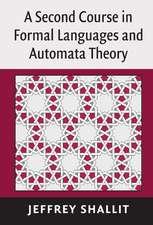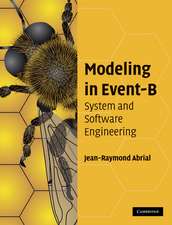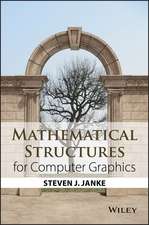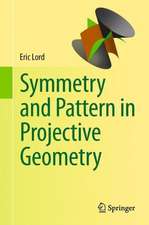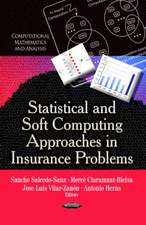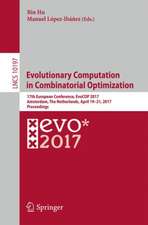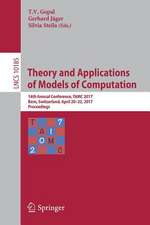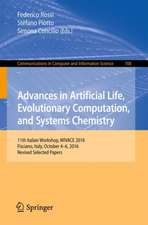Formal Specification and Design: Cambridge Tracts in Theoretical Computer Science, cartea 35
Autor L. M. G. Feijs, H. B. M. Jonkersen Limba Engleză Paperback – 9 noi 2005
Din seria Cambridge Tracts in Theoretical Computer Science
- 20%
 Preț: 490.79 lei
Preț: 490.79 lei - 20%
 Preț: 502.38 lei
Preț: 502.38 lei - 20%
 Preț: 1143.42 lei
Preț: 1143.42 lei - 20%
 Preț: 355.71 lei
Preț: 355.71 lei - 20%
 Preț: 377.22 lei
Preț: 377.22 lei - 20%
 Preț: 268.19 lei
Preț: 268.19 lei - 20%
 Preț: 273.24 lei
Preț: 273.24 lei - 20%
 Preț: 487.99 lei
Preț: 487.99 lei - 20%
 Preț: 622.53 lei
Preț: 622.53 lei - 11%
 Preț: 509.34 lei
Preț: 509.34 lei - 20%
 Preț: 378.32 lei
Preț: 378.32 lei - 20%
 Preț: 196.37 lei
Preț: 196.37 lei - 20%
 Preț: 444.60 lei
Preț: 444.60 lei - 20%
 Preț: 321.53 lei
Preț: 321.53 lei - 20%
 Preț: 389.91 lei
Preț: 389.91 lei - 20%
 Preț: 319.39 lei
Preț: 319.39 lei - 20%
 Preț: 322.04 lei
Preț: 322.04 lei - 20%
 Preț: 453.03 lei
Preț: 453.03 lei - 20%
 Preț: 254.65 lei
Preț: 254.65 lei - 20%
 Preț: 313.04 lei
Preț: 313.04 lei - 20%
 Preț: 267.54 lei
Preț: 267.54 lei - 20%
 Preț: 321.87 lei
Preț: 321.87 lei - 20%
 Preț: 379.83 lei
Preț: 379.83 lei - 20%
 Preț: 355.60 lei
Preț: 355.60 lei - 20%
 Preț: 296.25 lei
Preț: 296.25 lei -
 Preț: 372.97 lei
Preț: 372.97 lei - 20%
 Preț: 334.54 lei
Preț: 334.54 lei - 20%
 Preț: 359.58 lei
Preț: 359.58 lei - 20%
 Preț: 277.21 lei
Preț: 277.21 lei - 20%
 Preț: 431.42 lei
Preț: 431.42 lei - 20%
 Preț: 278.44 lei
Preț: 278.44 lei - 20%
 Preț: 300.53 lei
Preț: 300.53 lei - 20%
 Preț: 486.27 lei
Preț: 486.27 lei - 20%
 Preț: 612.71 lei
Preț: 612.71 lei - 20%
 Preț: 407.01 lei
Preț: 407.01 lei - 20%
 Preț: 387.43 lei
Preț: 387.43 lei - 20%
 Preț: 267.04 lei
Preț: 267.04 lei
Preț: 357.90 lei
Preț vechi: 447.37 lei
-20% Nou
Puncte Express: 537
Preț estimativ în valută:
68.51€ • 74.44$ • 57.58£
68.51€ • 74.44$ • 57.58£
Carte tipărită la comandă
Livrare economică 21 aprilie-05 mai
Preluare comenzi: 021 569.72.76
Specificații
ISBN-13: 9780521435925
ISBN-10: 0521435927
Pagini: 352
Dimensiuni: 170 x 245 x 18 mm
Greutate: 0.56 kg
Ediția:Pbk Version
Editura: Cambridge University Press
Colecția Cambridge University Press
Seria Cambridge Tracts in Theoretical Computer Science
Locul publicării:Cambridge, United Kingdom
ISBN-10: 0521435927
Pagini: 352
Dimensiuni: 170 x 245 x 18 mm
Greutate: 0.56 kg
Ediția:Pbk Version
Editura: Cambridge University Press
Colecția Cambridge University Press
Seria Cambridge Tracts in Theoretical Computer Science
Locul publicării:Cambridge, United Kingdom
Cuprins
Part I. Algebraic Specification: 1. Introducing the basic concepts; 2. Setting up algebraic specifications; 3. Structuring algebraic specifications; 4. Implementing algebraic specifications; Part II. State-Based Specification: 5. From algebras to states; 6. Setting up state-based specification; 7. Structuring state-based specification; 8. Implementing state-based specification; Part III. Advanced Techniques: 9. Theoretical topics; 10. Additional language constructs; 11. Towards large systems; Bibliography; Appendices; Index.
Descriere
The authors describe specification techniques from the unified view of the Common Object-oriented Language for Design.
